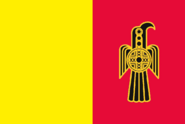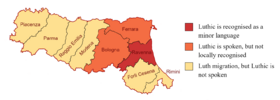User:Waahlis/Old main page
|
This wiki is aimed at facilitating the development and creation of constructed languages, conlangs. Constructed languages are made with many different purposes in mind; experimentation, internationalisation, enjoyment and a lot more. They are often linked to constructed cultures and other kinds of inspired settings. Constructed languages have almost endless possibilities, so try making one!
Welcome to Linguifex!
- Comlang:
 A few dedicated users are right now constructing the wiki's first ever community conlang, or "comlang"! Why not stop by to see how the work is progressing, and if there's something you can do to help?
A few dedicated users are right now constructing the wiki's first ever community conlang, or "comlang"! Why not stop by to see how the work is progressing, and if there's something you can do to help?
- Natlang Phonologies: A great import of phonologies of natural languages from Wikipedia is currently a source of discussion. Stop by and make your opinion heard!
- Conlangery: The wiki was mentioned on the podcast Conlangery (starting at 1:46:02).
- After Wikkii experienced a small fallout with the MediaWiki code, the Conlang wiki is proudly up and running again!
- Conlangery: One of the Wiki's languages, Kihā́mmic, was used as the "Top of Show Greeting" for episode 68 of Conlangery on Agglutination.
| Luthic | |
|---|---|
| Lûthica | |
 Flag of the Luthic-speaking Ravenna | |
| Pronunciation | [ˈlu.ti.xɐ] |
| Created by | Lëtzelúcia |
| Date | 2023 |
| Setting | Alternative history Italy |
| Native to | Ravenna; Ferrara and Bologna |
| Ethnicity | Luths |
| Native speakers | 149,500 (2020) |
Indo-European
| |
Early forms | Proto-Luthic
|
Standard form | Standard Ravennese Luthic (Lûthica)
|
Dialects |
|
| Official status | |
Recognised minority language in | |
| Regulated by | Council for the Luthic Language |
| Language codes | |
| CLCR | qlu |
| BRCL | luth |
 The areas where Luthic (red and orange) is spoken. | |
Luthic (/ˈluːθ.ɪk/ LOOTH-ik; endonym: Lûthica [ˈlu.ti.xɐ]) is an Italic language that is spoken by the Luths, with strong East Germanic influence. Unlike other Romance languages, such as Portuguese, Spanish, Catalan, Occitan and French, Luthic has a large inherited vocabulary from East Germanic, instead of only proper names that survived in historical accounts, and loanwords. About 250,000 people speak Luthic worldwide.
Luthic is the result of a prolonged contact among members of both regions after the Gothic raids towards the Roman Empire began, together with the later West Germanic merchants’ travels to and from the Western Roman Empire. These connections, the interactions between the Papal States and the conquest by the Germanic dynasties of the Roman Empire slowly formed a creole as a lingua franca for mutual communication.
As a standard form of the Gotho-Romance language, Luthic has similarities with other Italo-Dalmatian languages, Western Romance languages and Sardinian. The status of Luthic as the regional language of Ravenna and the existence there of a regulatory body have removed Luthic, at least in part, from the domain of Standard Italian, its traditional Dachsprache. It is also related to the Florentine dialect spoken by the Italians in the Italian city of Florence and its immediate surroundings.
Luthic is an inflected fusional language, with four cases for nouns, pronouns, and adjectives (nominative, accusative, genitive, dative); three genders (masculine, feminine, neuter); and two numbers (singular, plural).
| Rangyayo (琅野語) is the native language of the Rangyan people and an official language of the East Asian island nation of Rangya. It is currently classified as a language isolate but could has proposed ties to the hypothetical Altaic language family. Rangyayo is notable for its mixed-logographic and featural orthography, agglutinative grammar and organic mixture of native and Sinitic vocabulary. | |||||||||||||||
| Type[*] | Alignment[*] | Head-direction[*] | Tonal | Declension[*] | Conjugation[*] | ||||||||||
|---|---|---|---|---|---|---|---|---|---|---|---|---|---|---|---|
| Agglutinating | Nominative-accusative | Final | Yes | Case | Number | Voice | Mood | Person | |||||||
| Definiteness | Gender | Number | Tense | Aspect | |||||||||||
- Not sure where to start?
- If you are new to wikis, you may want to read the Help pages.
- For new editors: Please read our style guide, introduction guide and policies, before creating a new page.
- Adding content
- If you want to help but you're not sure where to start, try improving the various stub articles by expanding them.
- Add a new, needed category.
- Another helpful activity would be to check the list of wanted pages for frequently linked-to articles that don't exist yet.
- Providing linguistic and phonetic information.
- You can find a list of needed templates here.
- Wiki maintenance
- Help us by lending a hand with one of our current projects.
- Make your voice heard in our policy discussion.
- Clean up articles in need of attention.
- Fix broken or double redirects.
- Editorial help correcting spelling or grammar is always appreciated.
Do you want to create a language? It can take a lot of work to make it presentable but the results are often amazing! To make your own language you need to decide on:
- The phonology - the sounds of the language.
- The grammar - the framework of the language.
- The vocabulary - the words and dictionary of the language.
Enter a title in the box below to start creating your language.
For more information on linguistics see our guide and the linguistics section.
The Kihā́mmic translation of the Lord's Prayer!
Linguifex houses not just your language, but a dictionary similar to Wiktionary, namely, Contionary. Here you can create and share the vocabulary and details of your constructed language! Write your word (no capitals) and get going!
For more information on the Contionary, see our words and introduction!